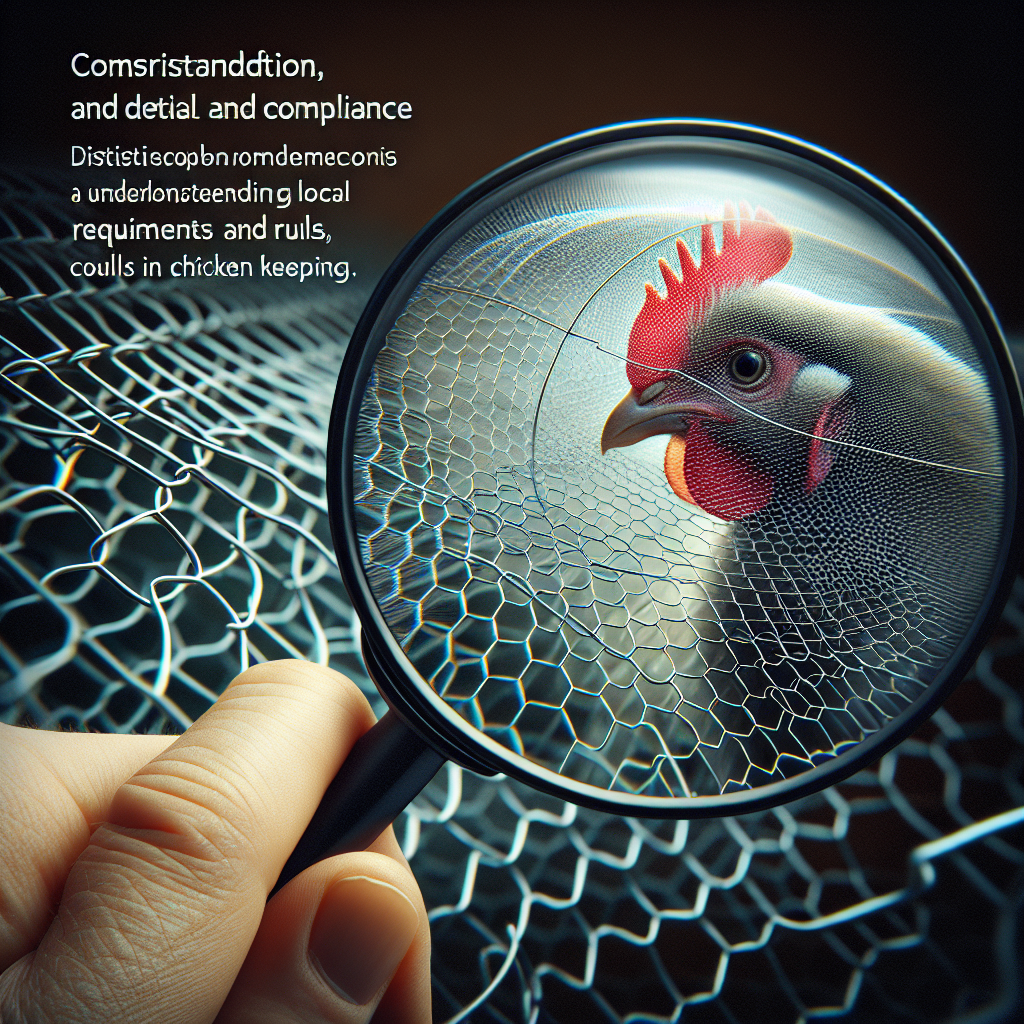Have you recently embarked on your journey as a chicken owner, but find yourself feeling unsure about how to care for your feathered friends when they fall ill? In this article, we will explore the essential steps for beginners to recognize and address common chicken ailments. By understanding the signs and symptoms to look out for and implementing appropriate treatments, you’ll gain the confidence to keep your poultry happy and healthy. So, let’s get started on this informative journey towards becoming a savvy chicken caretaker!
Understanding Common Chicken Ailments
Overview of Common Ailments
As a new chicken owner, it’s important to familiarize yourself with the most common ailments that affect chickens. Some of the common ailments include respiratory diseases, digestive disorders, parasitic infestations, external injuries and wounds, reproductive issues, and nutritional deficiencies. Understanding these ailments will help you to quickly identify and address any health issues that may arise in your flock.
Importance of Recognizing and Addressing Ailments
Recognizing and addressing chicken ailments is crucial for the overall health and well-being of your flock. Ignoring or neglecting the signs of illness can lead to the spread of diseases among your chickens, causing unnecessary suffering and possible death. By being proactive and knowledgeable about common ailments, you can ensure that your chickens receive prompt and appropriate medical care, leading to faster recovery and improved overall flock health.
Creating a Healthy Environment
Maintaining Clean and Hygienic Conditions
One of the most important steps in preventing and addressing chicken ailments is to maintain a clean and hygienic environment for your birds. Regularly clean the coop and remove any accumulated droppings, as these can harbor bacteria and parasites. Provide fresh bedding, such as straw or wood shavings, to keep the coop dry and decrease the risk of moisture-related ailments.
Proper Ventilation and Temperature Control
Proper ventilation and temperature control are essential for creating a healthy environment for your chickens. Ensure that the coop has adequate ventilation to prevent the buildup of ammonia from feces and urine. Monitor the temperature inside the coop, keeping it within the recommended range for the specific breed of chicken you have. Extreme temperatures can stress chickens, making them more susceptible to illnesses.
Ensuring Access to Fresh Water and Nutritious Feed
Offering your chickens access to fresh, clean water and nutritious feed is vital for maintaining their overall health and preventing certain ailments. Ensure that there is always a source of clean water available to your chickens, and regularly check and clean the water containers. Feed your flock a balanced diet that includes a good quality chicken feed, supplemented with occasional treats like fruits and vegetables. A well-nourished chicken is more resistant to diseases and infections.
Identifying Symptoms of Illness
Visual Observation
One of the most effective ways to identify illness in chickens is through visual observation. Pay close attention to the appearance of your birds, noting any changes in their feathers, eyes, feet, or wattles. Look out for abnormal swelling, discoloration, discharge, or wounds. Additionally, observe their behavior and daily routines for any deviations or signs of distress.
Behavioral Changes
Changes in behavior can often indicate an underlying health issue. Watch out for lethargy, loss of appetite, decreased or increased vocalization, increased aggression, or any unusual behavior patterns. If you notice significant changes in your chicken’s behavior, it may be a sign that they are unwell and in need of attention.
Abnormalities in Egg Production
Egg-laying chickens may exhibit abnormalities in their egg production when they are unwell. Look for changes in the frequency, size, shape, color, or quality of the eggs. For example, a sudden decrease in egg production or the presence of soft-shelled eggs could be indicative of an underlying health problem.
Diagnostic Methods
Consulting a Veterinarian
If you suspect that your chicken is unwell, consulting a veterinarian who specializes in poultry is highly recommended. A professional veterinarian will have the knowledge and expertise to diagnose and treat a wide range of chicken ailments. They can provide guidance and advice tailored to your specific flock, ensuring the health and well-being of your birds.
Utilizing Online Resources and Reference Materials
Online resources and reference materials can be valuable tools for learning about chicken ailments and their treatments. Many reputable websites and forums provide information on common chicken ailments, symptoms, and potential treatment options. However, it’s important to use these resources as a supplement to professional veterinary advice, as they may not always provide accurate or up-to-date information.
Joining Chicken Enthusiast Communities
Joining online or local communities of chicken enthusiasts can be a great way to learn from experienced chicken owners. These communities can provide support, advice, and personal insights into dealing with common chicken ailments. Engaging with like-minded individuals who have faced similar challenges can help you gain valuable knowledge and expertise in recognizing and addressing chicken ailments.
Preventive Measures
Routine Health Checks
Performing routine health checks on your chickens is an essential preventive measure. Regularly inspect each bird for any physical abnormalities, such as abnormal lumps, skin irritations, or changes in weight. Monitor their behavior, appetite, and egg production. By establishing a routine and familiarizing yourself with the baseline health of your flock, you’ll be better equipped to spot any potential health issues early on.
Vaccinations and Medications
Vaccinations and medications play a crucial role in preventing and managing common chicken ailments. Consult with your veterinarian to determine which vaccinations are necessary for your flock based on the prevalent diseases in your area. Administering medications, such as dewormers or antibiotics, as prescribed by your veterinarian, can help prevent and control parasitic infestations or bacterial infections.
Proper Quarantine Procedures
Proper quarantine procedures are essential when introducing new chickens to your flock or when you suspect an individual bird may be sick. Quarantining new birds for a minimum of 30 days allows you to observe them for signs of illness before introducing them to the existing flock. This precautionary measure helps prevent the spread of diseases and protects the overall health of your flock.
Addressing Common Ailments
Respiratory Diseases
Respiratory diseases are common in chickens, and symptoms may include coughing, sneezing, nasal discharge, difficulty breathing, or labored breathing. Address respiratory diseases promptly by isolating affected birds, ensuring proper ventilation, and providing supportive care. Consult with a veterinarian for a diagnosis and appropriate treatment options.
Digestive Disorders
Digestive disorders can manifest as diarrhea, decreased appetite, weight loss, or crop impaction. To address digestive disorders, ensure your chickens have access to clean water and a proper diet. If symptoms persist, consult with a veterinarian who can provide guidance on dietary adjustments or prescribe medications to alleviate the issue.
Parasitic Infestations
Parasitic infestations, such as mites, lice, or worms, can cause discomfort and health problems for your chickens. Regularly inspect your birds for signs of infestation, including feather loss, skin irritations, or excessive itching. Treatments for parasitic infestations may include topical or oral medications, dusting powders, or herbal remedies. Consult with a veterinarian for appropriate treatment options.
External Injuries and Wounds
External injuries and wounds can occur due to fights, predator attacks, or accidents. Clean any wounds with a mild antiseptic solution and monitor closely for signs of infection, such as redness, swelling, or discharge. In some cases, sutures or wound dressings may be necessary. If a wound is severe or doesn’t improve within a few days, seek veterinary assistance.
Reproductive Issues
Reproductive issues in chickens can vary from egg binding to reproductive tract infections. If a hen is experiencing egg binding, gently soak her in warm water and consult with a veterinarian for guidance. Reproductive tract infections may require antibiotic treatment. Proper nutrition and ensuring appropriate lighting and nesting conditions can help minimize reproductive issues.
Nutritional Deficiencies
Nutritional deficiencies can result in stunted growth, poor feather quality, reduced egg production, or weakened immune systems in chickens. Ensure your birds have access to a balanced diet that includes appropriate levels of proteins, vitamins, and minerals. If you suspect a nutritional deficiency, consult with a veterinarian who can provide guidance on dietary adjustments or supplements.
Natural Remedies
Garlic and Apple Cider Vinegar
Garlic and apple cider vinegar are often used as natural remedies in chicken healthcare. Garlic is believed to have antimicrobial properties, while apple cider vinegar can promote gut health. Introducing small amounts of garlic or apple cider vinegar to your chickens’ diet can potentially help boost their immunity and overall health. However, it’s important to consult with a veterinarian before incorporating these remedies.
Herbs and Herbal Supplements
Certain herbs and herbal supplements are known for their potential health benefits in chickens. For example, oregano, thyme, and mint are believed to possess antimicrobial properties and can be added to the chickens’ diet or bedding. Herbal supplements, such as echinacea or garlic capsules, may also be considered. Always consult with a veterinarian to ensure safe and appropriate usage.
Probiotics and Fermented Foods
Probiotics and fermented foods can promote a healthy gut microbiome in chickens. Including probiotic supplements or fermented foods, such as yogurt or fermented grains, in their diet can support digestion and improve overall health. However, it’s important to choose probiotic products formulated specifically for chickens and follow dosage instructions provided by a veterinarian.
Administering Medications
Understanding Dosages and Application Methods
When administering medications to your chickens, it’s crucial to understand the appropriate dosages and application methods. Dosages may vary based on chicken breed, weight, and condition being treated. Medications can be administered orally, topically, or through injection. Follow your veterinarian’s instructions carefully and consult them if you have any questions or concerns.
Common Medications for Chicken Ailments
Common medications used to treat chicken ailments include antibiotics, antiparasitics, and anti-inflammatories. Antibiotics are prescribed for bacterial infections, while antiparasitics help control external or internal parasites. Anti-inflammatories are used to alleviate pain and inflammation. However, it is important to remember that medications should only be used under veterinary guidance to ensure proper diagnosis and treatment.
Consulting a Veterinarian for Prescriptions
Consulting a veterinarian for prescriptions is essential when it comes to administering medications to your chickens. A veterinarian will assess your chicken’s symptoms, diagnose the underlying ailment, and prescribe appropriate medications. They will also provide guidance on dosage, application methods, and any potential side effects. Always follow your veterinarian’s advice and never use medications without their authorization.
Importance of Quarantine
Separating Sick Birds
Quarantine is crucial for preventing the spread of diseases within your flock. If you suspect that a chicken is sick, immediately separate it from the rest of the flock. Isolate the sick bird in a separate, well-ventilated area, and monitor its symptoms closely. This prevents the potential transmission of diseases and allows you to provide focused care to the affected bird.
Observing Quarantine Period
When introducing new chickens to your flock, observe a strict quarantine period of at least 30 days. This allows you to monitor the newcomers for any signs of illness before they potentially infect the existing flock. During the quarantine period, regularly check the new birds for symptoms, ensure they receive the necessary vaccinations, and consult a veterinarian if any health issues arise.
Disinfecting Equipment and Areas
Maintaining a clean and disease-free environment is crucial for the health of your chickens. Disinfect any equipment or areas that may have come into contact with sick birds, such as feeders, waterers, or the quarantine area. Use appropriate disinfectants recommended by your veterinarian. Regularly clean and disinfect the coop to minimize the risk of disease transmission and promote the overall well-being of your flock.
Seeking Professional Help
Identifying when to Seek Veterinary Assistance
While you can address some chicken ailments on your own, there are instances when it is crucial to seek veterinary assistance. If you notice severe symptoms, persistent health issues, or situations that require professional expertise, do not hesitate to contact a poultry veterinarian. They can provide accurate diagnosis, individualized treatment plans, and guidance to ensure the best possible care for your chickens.
Finding a Poultry Veterinarian
Finding a poultry veterinarian with experience in chicken health is essential for comprehensive care. Research local veterinary clinics or specialized poultry healthcare providers in your area. Ask for recommendations from fellow chicken owners or poultry enthusiasts in your community. Ensure that the veterinarian has a good reputation, is knowledgeable about chicken health, and has the necessary facilities to provide proper care.
Importance of Regular Check-ups
Regular check-ups with a poultry veterinarian are important for proactive chicken healthcare. A veterinarian can perform thorough examinations, provide vaccinations, and offer guidance on preventive measures. By scheduling regular check-ups, you demonstrate your commitment to your flock’s health and ensure any potential health issues are addressed promptly.
By understanding common chicken ailments, creating a healthy environment, knowing how to identify symptoms of illness, utilizing diagnostic methods, implementing preventive measures, addressing common ailments, utilizing natural remedies, administering medications properly, understanding the importance of quarantine, seeking professional help when needed, and prioritizing regular check-ups, you can become a knowledgeable and confident chicken owner capable of recognizing and addressing common chicken ailments effectively. With your dedication and attention to their health, your flock will thrive and bring you joy for years to come.




